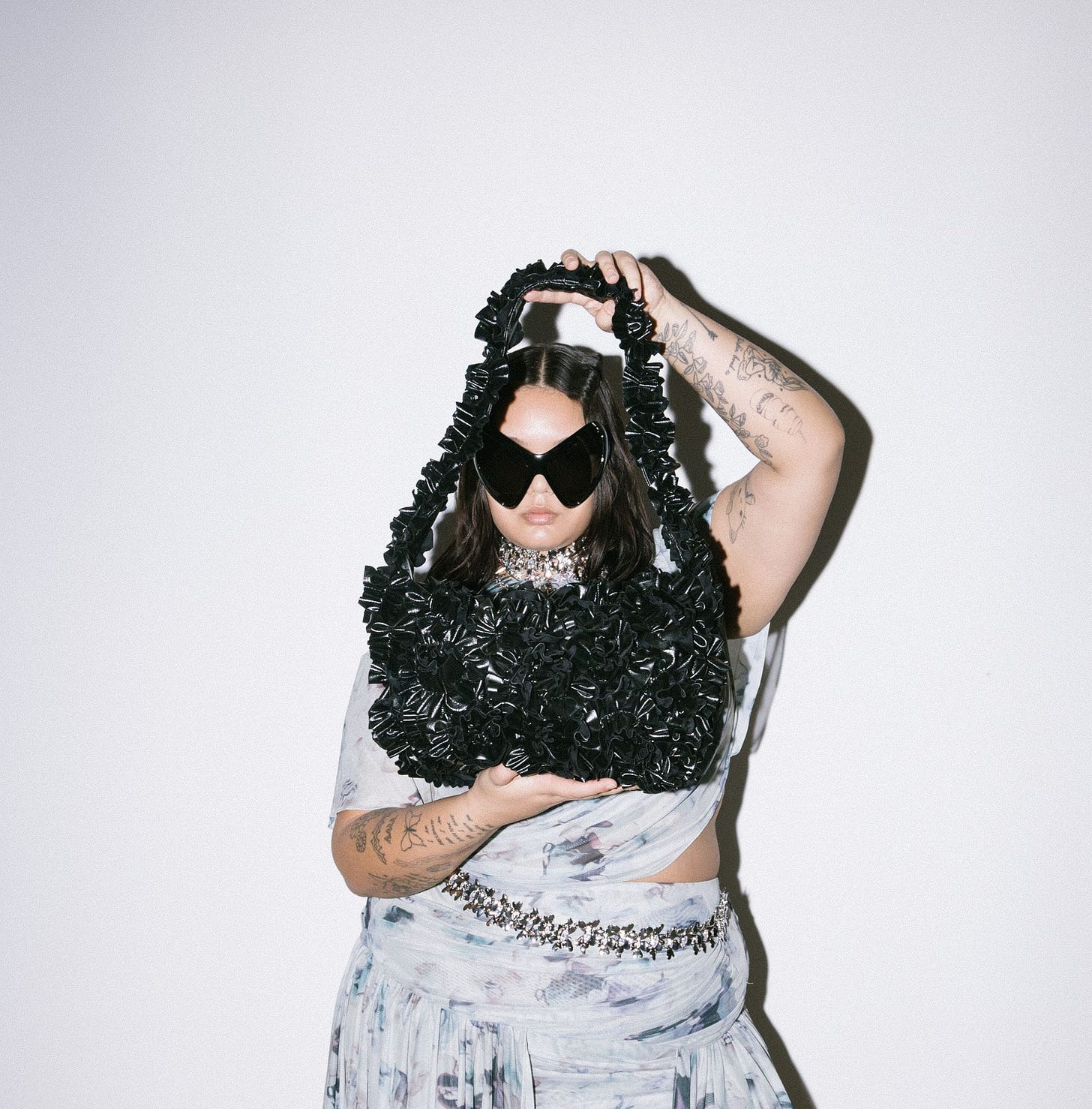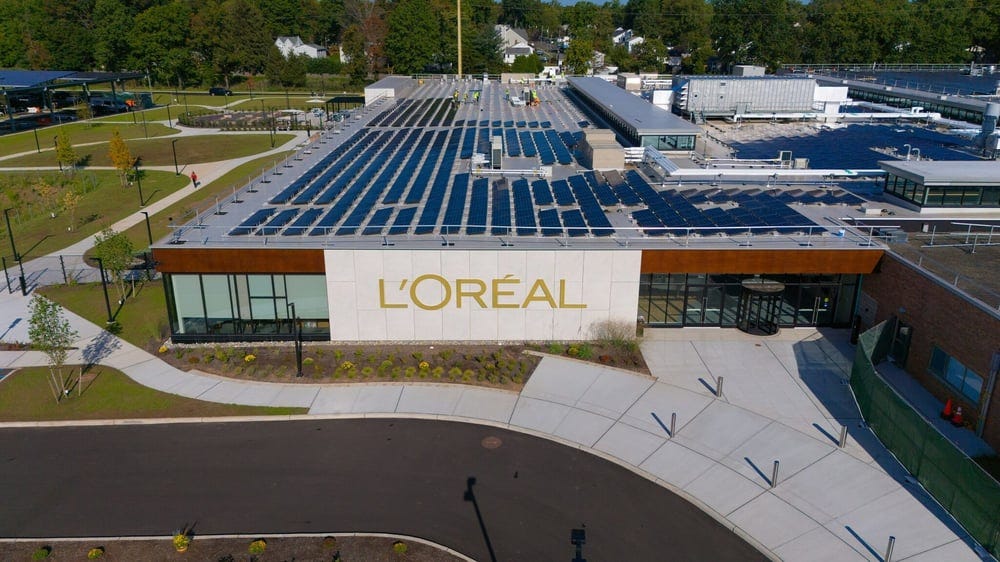From mushrooms to NYFW's runway, Collina Strada is taking next-gen materials to the next level
This week's All Things Fashion Tech Newsroom: UK brands take center stage with resale programs, size technology expansion & L'Oréal makes a $160 million move.
Collina Strada teams up with textile innovator, TômTex, to debut a next-gen material bag on their NYFW runway
Online sizing technology, Unisize, enters the UK
How department stores worldwide are enhancing customer loyalty
Soeur launched their resale program, Sœur Second Hand, in partnership with Faume
L’Oreal opens new North America Research & Innovation Center
Why Collina Strada is betting on a biomaterial company
ByJeena Sharma of Retail Brew
Over the past few seasons, sustainability has remained a major theme at New York Fashion Week with designers across the board increasingly incorporating recyclable, and dead-stock fabrics into their collections.
This year, the theme continued as Collina Strada, among other major brands, served up a collection championing sustainability, a commitment that remained central to the foundation of the company.
The New York-based retailer that said it serves as a “platform for climate awareness, social awareness, change, and self expression,” presented a series of outfits crafted from a thrift store haul in New Jersey. Founder Hillary Taymour transformed “heirloom wedding dresses into modern Collina couture,” that included dresses, wool coats, and other outerwear, the show notes stated.
A big standout at the show, however, were the accessories created in collaboration with Brooklyn-based biomaterials company TômTex.
Made with the company’s proprietary biodegradable vegan materials, the line of accessories featured black leather bags and hand purses—all channeling fun silhouettes such as “scrunchie bag” and “dog muff.”
“Our collaboration with Collina Strada was about proving that sustainability and creativity aren’t opposing forces—they fuel each other,” Uyen Tran, founder of TômTex, told Retail Brew via email. “Hillary Taymour’s fearless approach to design made her the perfect partner to push the boundaries of what next-gen materials can do. We didn’t want to just replace leather; we wanted to create something entirely new, something that expands what’s possible in fashion.”
After contract wins and category expansion, sizing tech firm Makip sets up official UK subsidiary
By Nigel Taylor of Fashion Network
Online sizing technology provider Makip says it's "rapidly expanding", and if confirmation is required, the business has officially entered the UK market, establishing Makip London Limited.
The Japanese company, whose online sizing technology Unisize is a provider to major retailing brands such as Lacoste, Fred Perry and Calvin Klein, calls entering the UK “an important step in accelerating its global expansion and is part of its strategy to strengthen its presence in overseas markets”.
“Together with our overseas team, we are committed to taking on the challenges faced by UK retailers to deliver performances worthy of the reputation we have built over a decade of working in Japan and becoming the most popular online sizing technology. Looking ahead, I aim to position Makip, and Unisize, as a leading name in UK Fashion Tech within a few years.”
He noted that the issue of “inadequate size information in apparel e-commerce leads to persistently high return rates.
“This has increased the return handling costs for retailers and raised environmental concerns as returned products are often discarded. Unisize addresses these issues as has the user data to prove it.”
Tsukamoto concluded: “By identifying local needs and offering a unique and highly accurate online sizing service we aim to help UK retailers overcome the challenges they face with online sizing and enhance the overall online customer experience.
How department stores worldwide are enhancing customer loyalty
By Marion Deslandes of Fashion Network
Department stores have shifted "from a traditional, broad marketing approach to targeted, ongoing customer interactions," the organization explains. "In the past, one-to-one interactions depended on skilled salespeople." Now, these retailers are transitioning toward predictive models to anticipate customer behavior and deliver hyper-personalized experiences, requiring advanced technical infrastructures to process data more precisely.
Data management is central to this shift. El Palacio de Hierro has consolidated multiple disparate databases into a single platform in Mexico, integrating everything from checkout transactions to travel agency bookings and restaurant receipts. Meanwhile, at Magasin du Nord in Denmark, consumer segmentation modeling has been implemented, creating multiple sub-profiles and leading to a loyalty program that leverages sophisticated customer profiling, combining internal data with publicly available information.
Loyalty programs are also evolving to engage better and satisfy consumers. Bloomingdale's in the U.S. focuses on gathering customer feedback to improve the shopping experience, while Breuninger in Germany prioritizes its most premium clientele. Swiss retailer Manor has partnered with Mastercard to facilitate credit payments, noting that cardholders spend significantly more than other customers. Meanwhile, the Chalhoub Group in the Middle East has adopted WhatsApp as a new communication channel, achieving higher conversion rates than traditional email and SMS campaigns.
Retailers are seamlessly blending their online and in-store experiences to engage customers across both channels. According to IADS, Boyner found that omnichannel shoppers buy more frequently and generate higher revenue than single-channel customers.
Soeur strengthens its CSR commitments and expands its second-hand offering
By Olivier Guyot for Fashion Network
The initiative, which took several quarters to develop, was created in collaboration with resale specialist Faume. Customers can drop off their old pieces at Soeur boutiques.
"We take back all products from collections after 2021, provided they are not damaged. Customers receive a voucher that, for the launch phase, is worth approximately 50% of the product's full-price value," explained Freja Day, Soeur's general manager. She also noted her surprise at the overwhelming customer interest in the initiative.
Launching a second-hand platform remains a bold move as brands continue to refine profitability models for resale. "We approached this project more from a CSR conviction," said Day. "This has been on our radar for some time, but before, we were too small to take on such a complex initiative. Now, we're in a better position to absorb it. We started by working on material certification and factory audits, then trained our teams on the Climate Fresco. We've built collective expertise on these issues. It's an important topic and one that resonates internally. I also see it as a long-term brand positioning strategy. Soeur has always promoted a timeless vision of fashion—classic with a subtle twist, designed to stand the test of time. This project allows us to demonstrate that commitment."
For Day, the initiative also reinforces the creative vision of Domitille Brion, Soeur's creative director and co-founder. The 52 Soeur boutiques trained their staff to assist customers with the resale process, while logistics and final product preparation are managed by Faume, which also works with brands like Ba&Sh, Ami, and Isabel Marant.
L’Oreal opens new North America Research & Innovation Center
By Jennifer Braun of FashionUnited
Representing a $160 million investment, the nearly 250,000-square-foot facility is L'Oréal's largest R&I center outside of France and underscores its long-term commitment to the U.S. market, economy, and workforce. Construction of the center began in 2022, while full-scale operations commenced in February.
The R&I Center will play a key role in developing L'Oréal's American brands, including Maybelline, CeraVe, Redken, and Kiehl's. Notable features of the facility include a 26,000-square-foot modular laboratory, a consumer co-creation center that accommodates up to 400 daily participants for product testing, and an on-site mini factory for scaling final formulations before full production.
"The U.S. plays a defining role in shaping the future of beauty. With its diverse and demanding consumers and world-leading innovation ecosystem, it is the ideal environment to drive our vision forward,” said Barbara Lavernos, deputy CEO of L'Oréal Groupe, in charge of research, innovation, and technology.
“This center embodies L'Oréal's uniquely end-to-end innovation model, from upstream Advanced Research on new breakthrough ingredients to the downstream development of formulas ready for scale-up to deliver high-performance, safe, and responsible beauty solutions.”
The facility joins L'Oréal's global R&I hubs in France, Brazil, South Africa, India, China, and Japan. It will employ more than 600 scientists, engineers, and researchers. The center will also collaborate with leading academic institutions, biotech firms, and startups to drive advancements in sustainability, inclusivity, and personalization across skin tones, hair types, and beauty preferences.
Quick Headlines
Victoria’s Secret & Co. Launches First Digital Product Passports
Halfdays parntered with Trove to power resale program: SECOND LIFT
For the first time ever, the environmental impact of clothing repair has been captured
Armoire has climbed the ranks on the GeekWire 200 list of top Pacific Northwest startups
5 new Startups have just joined the latest cohort of L'Oreal’s Beauty Tech Atelier
Archive launched Karhu sneakers’ resale program: Karhu Renewed
Elena Velez introduce her audience to an immersive world of AI-generated video during NYFW









